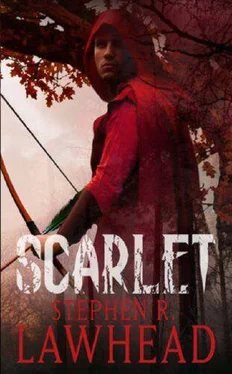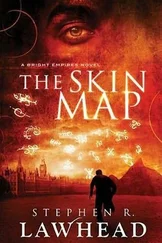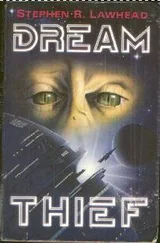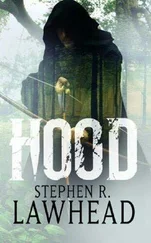Stephen Lawhead - Scarlet
Здесь есть возможность читать онлайн «Stephen Lawhead - Scarlet» весь текст электронной книги совершенно бесплатно (целиком полную версию без сокращений). В некоторых случаях можно слушать аудио, скачать через торрент в формате fb2 и присутствует краткое содержание. Жанр: Фэнтези, на английском языке. Описание произведения, (предисловие) а так же отзывы посетителей доступны на портале библиотеки ЛибКат.
- Название:Scarlet
- Автор:
- Жанр:
- Год:неизвестен
- ISBN:нет данных
- Рейтинг книги:4 / 5. Голосов: 1
-
Избранное:Добавить в избранное
- Отзывы:
-
Ваша оценка:
- 80
- 1
- 2
- 3
- 4
- 5
Scarlet: краткое содержание, описание и аннотация
Предлагаем к чтению аннотацию, описание, краткое содержание или предисловие (зависит от того, что написал сам автор книги «Scarlet»). Если вы не нашли необходимую информацию о книге — напишите в комментариях, мы постараемся отыскать её.
Scarlet — читать онлайн бесплатно полную книгу (весь текст) целиком
Ниже представлен текст книги, разбитый по страницам. Система сохранения места последней прочитанной страницы, позволяет с удобством читать онлайн бесплатно книгу «Scarlet», без необходимости каждый раз заново искать на чём Вы остановились. Поставьте закладку, и сможете в любой момент перейти на страницу, на которой закончили чтение.
Интервал:
Закладка:
"They own little enough as it is," Falkes pointed out. "Most of them hold land in common, and few of them recognise property rights of any kind. Money is little use to them; they barter for what they need. Whenever I tax a man, I am far more likely to be paid in eggs than silver."
"Eggs!" sneered his uncle. "I speak of taxes and you talk eggs."
"It happens more often than you know," declared Falkes, beginning to exhaust his own small store of patience.
"What about this creature of yours-this phantom of the forest?
What do they call it?"
"Rhi Bran y Hud," replied Falkes. "It means King Raven the Enchanter."
"The devil, you say! Have you caught the rascal yet?"
"Not yet," confessed Falkes. "Sheriff de Glanville is hopeful. It is only a matter of time."
"Time!" roared the baron. "It has been two years, man! How much more time do you need?"
"Father," said Earl Philip, speaking up just then, "may I suggest a visit to the commot? See it for yourself. You will quickly get the measure of Elfael. And you will see what Falkes is making of the place."
"A worthy suggestion, Philip," the baron had replied, curling the leather reins around his gloved fist as around the neck of an enemy, "but you know that is impossible. I am away to Rouen within the month. If all goes well, I should return before Christmas."
"I will speak to Abbot Hugo," said Falkes, "and we will hold the consecration at Christmas."
"Rouen is where Duke Robert is encamped," mused Philip, concern wrinkling his smooth brow. "What takes you there, Father?"
Then, while the hounds and their handlers spread out across the field before them, Baron de Braose had confided his plans to meet in secret with a few like-minded noblemen who were anxious to do something about the incessant fighting between the king and his brothers. "Their silly squabble is costing us money that would be better spent on the expansion of our estates and the conquest of Wales," the baron fumed, wiping sweat from his plump round face. "Whenever one of them thumbs his nose at the other, I have to raise an army and sail off to Normandie or Angevin to help the king slap down the knave. I've had a bellyful of their feuding and fighting. Something must be done."
"Dangerous words, Father," cautioned Philip. "I would be careful about repeating any of that anywhere. You never know who is listening."
"Phaw!" scoffed the baron. "I would tell Rufus to his face if he were here. The king must know how his noblemen feel. No, the situation is intolerable, and something must be done. Something will be done, by heaven."
Philip and Falkes exchanged a worried glance. Speech like this was dangerously close to treason. King William, who knew better than anyone else how little his nobles and subjects esteemed him, viewed even the slightest wavering of support as disloyalty; open disagreement was considered outright betrayal.
"If the king learns of this secret societe, he will not be best pleased," Philip pointed out. "You will all be condemned as traitors."
"The king will not learn of it," the baron boasted. He drew off a glove and swatted at a fly buzzing before his face, then dragged his blue linen sleeve across his forehead. "Special measures have been taken. We have appealed to the archbishop of Rouen, who has agreed to summon a council of noblemen concerning the papal succession."
"The archbishop has recognised Urban as pope," declared Philip, unimpressed with this revelation, "as everyone knows."
"Yes," granted his father, "but Urban's position is faltering just now. He is increasingly out of favour, and Clement occupies Rome. It would not take much to swing the balance his way."
"Is this what you propose to do? Throw the weight of the nobles behind Clement?"
"For certain concessions," the baron replied. "A papal ban on this continual family warring would be a good beginning."
"The king would ignore any declaration the pope might make-just as his father always did," scoffed Philip. "Comme le pere, donc le fils."
The baron frowned and looked to Falkes. "What say you, Count? Do you agree with my upstart son?"
"It is not my place to agree or disagree, Sire."
"Hmph!" snorted the baron in derision. "What good is that?"
"But if I might offer a suggestion," continued Falkes, choosing his words carefully, "it seems to me that while it is true the king is likely to ignore any censure by the church, were you to establish Clement firmly on the throne of Saint Peter, Clement would be in a position to offer William certain benefits in exchange for a signed treaty of peace between the king and his brothers."
"Precisely," agreed the baron. "Is this not what I was saying?"
"To make good Clement's claim," said Philip, "you must first depose Urban for good. Blood would flow."
"It may not come to that," replied the baron.
"If it did?"
"Que sera," answered his father. A drum began beating just then, and Baron de Braose gazed out across the field to a clump of beech trees where the handlers were waiting. "If all goes well, you will receive a sign before Christmas. I will send it with the winter supplies." With that, he put spurs to his mount and galloped away.
Earl Philip watched his father's broad back, his frown a scowl of displeasure. "A word beyond this field and we are dead men," he muttered.
"Count Falkes!" The baron called back to him. "When you catch this phantom raven of yours, let me know. I think I'd like to see him hang."
Well, thought Falkes de Braose as he rode into the town square, we would all like to see King Raven hang. And hang he would, there was no doubt about that. But there were other, more pressing matters on his mind than chasing down elusive thieves. And anyway, Elfael had been quiet lately-not an incident in many months. Most likely, the black bird and his band of thieves had been frightened away by the sheriff, and was now raiding elsewhere-someplace where the purses were fatter and the pickings easier.
Count Falkes paused outside Abbot Hugo's stone-built church. It was a handsome building. The abbot had spared no expense, commanding the finest materials available and gathering the best masons, and it showed.
The count had no great love for his abbot, a haughty, high-handed cleric who connived and conspired to get his way in everything-from the cloth of gold for the altar to the lead roof gleaming dully in the sun. That very roof Falkes paused to admire just now. Ordinary thatch was not good enough for Hugo; it had to be lead, cast in heavy sheets in Paris and shipped at great expense across the channel. And then there was the stonework-only the most skilled stonecutters were allowed to work on the archway carvings, producing the finest decoration money could buy. At the church entrance, Falkes stopped to examine a few of the finished sculptures-some of the last to be finished: a dragon with wings, chasing its tail for eternity; a centaur brandishing a sword; a lion and horse intertwined in mortal combat; Aquarius, the water man, with his bucket and ladle; an angel driving Adam and Eve from the Garden; a winged ox; a mermaid rising from the waves clutching an anchor; and more, all of them contained in dozens of small stone plaques around the arch and on the pillars.
Falkes traced the shapely outline of the mermaid with his finger. He had to admit that the work was extraordinary, but then, so was the cost-and increasingly difficult to bear. It meant, among other things, that he required constant support; he was still far too dependent for his survival on regular supplies from his uncle. True, the largest part of the problem was the baron himself, and his unquenchable zeal for conquest. If Baron de Braose was prepared to build slowly, to develop the land and settle the people, Count Falkes had no doubt that Elfael and the territories west could eventually be made to yield untold wealth. But the baron was not willing to wait, and Falkes had to bear the brunt of his uncle's impatience-just as he had to endure the umbrage of the abbot, whose spendthrift ways could well ruin them all.
Читать дальшеИнтервал:
Закладка:
Похожие книги на «Scarlet»
Представляем Вашему вниманию похожие книги на «Scarlet» списком для выбора. Мы отобрали схожую по названию и смыслу литературу в надежде предоставить читателям больше вариантов отыскать новые, интересные, ещё непрочитанные произведения.
Обсуждение, отзывы о книге «Scarlet» и просто собственные мнения читателей. Оставьте ваши комментарии, напишите, что Вы думаете о произведении, его смысле или главных героях. Укажите что конкретно понравилось, а что нет, и почему Вы так считаете.







